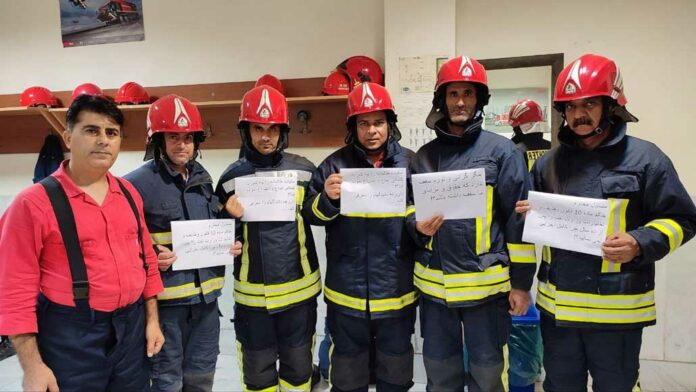By Kayhan Life Staff
The Iranian Council for Organizing Protests by Oil Industry Contract Workers said field workers and office personnel on permanent contracts in 30 operational sites and administrative offices protested over pay and benefits on Aug. 11.
The protests started in 45 workshops, refineries, petrochemical and oil companies, and several project phases of the South Pars Gas Fields Development in Asalouyeh in the southern province of Bushehr.
Protesters’ main demands include implementing Article 10 of the Petroleum Act of Iran, back pay, healthcare, removing the pension ceiling, replacing old oil and gas machinery, prosecuting those guilty of misappropriating Iranian national oil funds, and eliminating political, factional, and security appointments.
The Majlis (Iranian Parliament) passed Article 10 of the Iranian Oil Ministry’s Power and Duties Act on May 8, 2012. It states: “The recruitment, salaries, and benefits of employees of the Petroleum Ministry and its subsidiaries, who work in operational and specialized units, are not regulated by the Civil Service Management Laws but should be adjusted according to the industry-standard and competitive pay scale to maintain and promote expertise and excellence in the industry.”
The Iranian Council for Organizing Protests by Oil Industry Contract Workers said the protest by the oil industry employees will continue until Aug. 22, after which they will decide when to hold a mass protest.
The government budget deficit has resulted in reduced funding for government-owned companies and private sector contractors. As a result, an increasing number of workers and employees in industrial sectors, production, and service industry have not been paid their salaries and wages for months.
The shortage of raw materials has severely affected the manufacturing sector, causing them to reduce their workforce as a cost-cutting measure. An inflation rate of 50 percent, the high cost of living, and a shortage of essential goods have sparked massive protests by ordinary Iranians and people in various professions.
On the same day that oil industry workers held their protest, truck drivers at the Bazargan customs crossing in Maku, in the northwestern province of West Azerbaijan, continually honked their horns to protest the faulty electronic system and mismanagement of the customs office.
Social media footage showed a long line of trucks stuck at the Iran-Turkey border, honking their horns.
There have been reports of other protests in the last few days by workers in other fields, including farmers in Isfahan who gathered outside the Water Department in the city to protest against the water shortage and the severe drought caused by mismanagement of the Zayandeh Rud River.
Undated footage posted on social media showed protesting farmers outside Isfahan’s Water Department.
Iranian security forces arrested 230 teachers and union activists in April and May, Human Rights Activists News Agency (HRANA), said on June 21.
The Judiciary reportedly summoned 23 people, and interrogators have allegedly extracted “forced confessions” from dozens of imprisoned teachers, HRANA added.
Iranian authorities arrested two European tourists in May, both members of the federation of teachers’ unions in France, at Imam Khomeini Airport.
Iranian state TV broadcast a report produced by the Ministry of Intelligence, alleging that the two French nationals — Cecile Kohler, 37, and her partner Jacques Paris, 69 — had links to the protesting teachers and members of the teachers’ union. The authorities accused the two of trying to “incite unrest.”
Iran State TV Air Footage of French Couple Accused of Spying
France Says Two Citizens Arrested in Iran, Demands They Be Freed Immediately
The indictment also included Rasul Bedaghi, Jafar Ebrahimi, Eskandar Lotfi, Mohammad Habibi, Mohsen Omrani, Reza Shahabi, Reyhaneh Ansarinejad (all members of the Workers’ Union); Anisha Asdollahi (a translator); and Keyvan Mohtadi (a member of the Iranian Writers’ Association). They have all been in prison since their arrest.
The crackdown on protests and the arrests of workers and union activists have drawn unprecedented international condemnation. Some 130 workers’ unions from 40 countries have written to Iran’s Supreme Leader Ayatollah Ali Khamenei, the head of Iran’s Judiciary, Mohsen Ejei, and Iran’s Ambassador to the United Nations Saeed Iravani, calling for the immediate and unconditional release of union activists from prison.
The signatories to the letters said workers worldwide closely followed events in Iran.
The International Transport Workers’ Federation (ITF) sent a message to the Syndicate of Workers of Tehran and Suburbs Bus Company (SWTSBC), saying it never remained silent against the brutal treatment of union activists.
In recent weeks, there have been reports of oil workers and welders being taken to hospital after suffering heat strokes. Several workers have reportedly died of heat exhaustion in the southern province of Khuzestan in the past few weeks.
In an exclusive interview with Kayhan Life in July 2021, Milad, an engineer working for a company under contract with the Iranian Oil Ministry described the workplace environment as “inhumane.”
“The buses transporting workers to various project sites have broken seats and no air conditioning,” Milad explained. “Just imagine a worker who has worked all day in temperatures above 50 degrees Celsius having to ride this bus back to his dorm.”
In the same interview, Alireza, a welder with more than a decade of experience working on a project phase of the South Pars Gas Fields Development in Asalouyeh, said: “I currently work outside in temperatures close to 50 degrees Celsius with a welding torch that resembles a miniature sun. However, our supervisors treat us as overpaid unskilled workers.”
According to labor sources, workers in the gas, oil, and petrochemical industries in Iran’s south have asked their site managers to reduce their shift to six hours on hot days. However, the management has not responded to their request yet.
Workers have argued that current conditions are detrimental to their health and safety, warning that they will hold protests if the situation does not improve.








